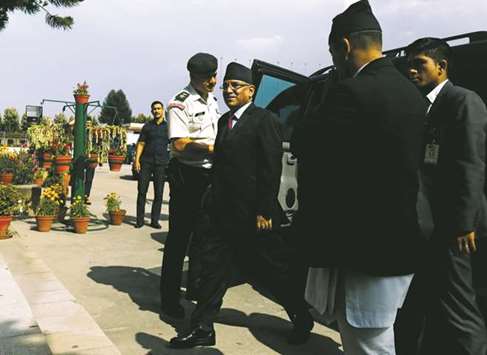Nepal Prime Minister Pushpa Kamal Dahal yesterday deferred his planned resignation from the top post, adding to political uncertainties in Kathmandu.
Earlier in the day, Dahal informed his cabinet colleagues that he will put in his papers to pave way for Nepali Congress president Sher Bahadur Deuba to become the next prime
minister.
On the other hand, Communist Party of Nepal-Unified Marxist-Leninist leader K P Oli said in parliament that the prime minister cannot resign in the middle of local elections and should continue until the second phase of elections on June 14 is completed.
A meeting of Dahal, Oli and Deuba, called by Speaker Onsari Gharti to sort out the stand-off, could not make headway as Oli remained adamant on his stand.
Parliament is slated to meet at 11am today and Dahal has called for a meeting of top political leadership ahead of the house meeting.
The proposed resignation of Dahal was to honour an accord signed in August last year when Dahal was elected the prime minister with Deuba’s support.
Both Dahal and Deuba had agreed to run the government on a rotational basis until elections to Parliament were held in February 2018, as per constitutional obligations.
According to the agreement, Dahal was to remain in office till the local elections were held whereas polls at the provincial and central levels were to be conducted under Deuba as the prime minister.
Earlier in the day, Cabinet members posed for group photos in anticipation of their last day in office before Dahal’s address to parliament.
However, the main opposition Communist Party of Nepal-Unified Marxist-Leninist did not allow the normal functioning of parliament.
The party opposed the move to change the demarcation of local bodies in the Terai (plains) region, dubbing it against the election code of conduct.
In a bid to address the grievances of agitating Madhes-based parties and to ensure their participation in second phase of local polls on June 14, the Dahal-led government had increased the numbers of local units in Terai region in proportion to the population.
Oli questioned how the numbers could be increased when only first phase of elections was over. “It is illegal and anti-constitutional,” the CPN-UML leader said.
Local elections in the first phase were held on May 14 in three Nepal provinces, mostly in the hills. The second phase is scheduled for June 14 in four provinces, mostly in the plains.
The numbers of local bodies going to polls in the second phase are almost double of the first.

Nepalese Prime Minister Pushpa Kamal Dahal arrives at the parliament in Kathmandu.
